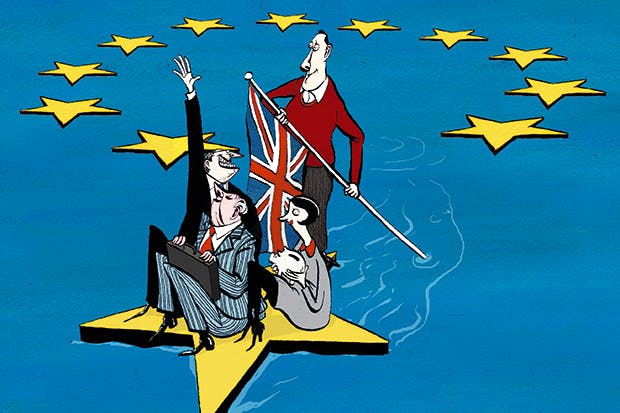Given the perilous condition of Britain’s public finances, perhaps we ought to start taking the IMF and its World Economic Outlook a little more seriously. It is not impossible to foresee Rachel Reeves or her successor having to repeat what one of her Labour predecessors, Denis Healey, had to do in 1976: and beg the IMF for an emergency loan. What the IMF thinks of the prospects for the UK economy will be key to what sort of deal she might be able to secure.
The IMF has, at least, ceased to make out that Britain is doomed to suffer a self-inflicted, Brexit-generated recession all of its own. On the contrary, it sees the UK economy expanding by 1.2 per cent in 2025 followed by 1.4 per cent in 2026 – compared with 1 per cent and 1.2 percent respectively for the Eurozone. No one should take these forecasts – nor indeed any economic forecasts – too seriously, but they are interesting in what they reveal about the workings of the IMF’s mind. For several years it was taken for granted that Brexit would harm UK growth. Now, the IMF is looking at other evidence which leads it to conclude that Britain’s prospects are not especially dark – we are merely bumping along the bottom, suffering the same sclerotic growth as the rest of Europe.
The last World Economic Outlook, in April, was published in the wake of Donald Trump’s ‘Liberation Day’. Unsurprisingly, that forecast a sharp deterioration in the outlook for the global economy. Equally unsurprisingly, today’s edition forecasts a less negative effect from Trump’s trade wars, as threatened tariffs have been lowered through trade deals such as that completed with the EU this week – which will impose tariffs of 15 percent on most imports from the EU, rather than the 30 percent previously announced.
The upwards revision in growth prospects, however, does not take the IMF’s forecasts back to the levels they were in January of this year, prior to Liberation Day. The evolution of the IMF’s forecast for global growth in 2025 is 3.3 per cent (January), 2.8 per cent (April) and 3 per cent (July). For the UK the figures are 1.6 per cent, 1.1 per cent and 1.2 per cent. For the Eurozone they are 1 per cent, 0.8 per cent and 1.0 per cent, and for the US 2.7 per cent, 1.8 per cent and 1.9 per cent.
Interestingly, while the IMF believes the US to have committed an act of self-harm, and that its tariffs will affect its own economy more than any other western economy, it is still expecting the US to outgrow Europe over the next couple of years. That would not be surprising, given recent history. The US has been outgrowing Europe to the tune of an extra 0.5 per cent per year this century. While that might not sound much put that way, compounded it is a very big deal indeed. If anything, the gap between the US and Europe is growing.
For China, however, the IMF has upgraded its prospects for economic growth relative to what it was predicting in January. It now expects the country’s economy to grow by 4.8 per cent over 2025 compared with 4.6 per cent in January. This is in spite of trade relations between China and the US being far from resolved in the way they have been with the EU, the UK, Japan and others. Trade with the US, it seems to have concluded, is not quite as important to China’s economy as many – not least Donald Trump – like to believe.
Trump’s tariff wars may have thrown the world into the economic equivalent of a panic attack. They may well harm the US, which has done remarkably well of lopsided trade arrangements with the rest of the world. Yet they have done little to change the underlying synopsis of the global economy: that the US and China continue to grow strongly, while Europe (including the UK) continue to lag behind.








Comments